|
|
|
Sort Order |
|
|
|
Items / Page
|
|
|
|
|
|
|
| Srl | Item |
| 1 |
ID:
091663


|
|
|
|
|
| Publication |
2009.
|
| Summary/Abstract |
In the 1920s and 1930s, the Modern Girl emerged in advertisements, cinema and public discourse all over the globe. While she was implicated in nationalist projects of social reform in post-war Britain and Japan, in multicultural, port-city environments such as Penang, the Modern Girl was central to a discourse of 'cosmopolitanism'. Lively debates about the Modern Girl in Penang's English press wrestled with the tensions between cultural authenticity, diversity and modernity. Male and female readers of the Straits Echo, from different ethnic backgrounds, engaged with each other in a shared public space about issues ranging from education and politics to women's liberality and fashion. The Modern Girl thus represents a new way of looking at the history of colonial Malaysia in the interwar period: one not focused on ethnic nationalism and communalism, but on a shared, multi-ethnic mode of belonging rooted in the globalist environment of the late colonial port-city.
|
|
|
|
|
|
|
|
|
|
|
|
|
|
|
|
| 2 |
ID:
091385
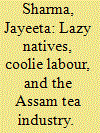

|
|
|
|
|
| Publication |
2009.
|
| Summary/Abstract |
This paper considers the creation of a 'coolie' work-force for the Assam tea industry and the local dimensions of tea plantation enterprise. While the industry has flourished through its use of migrant labour and export markets for tea, it has retained important connections with the locality. The Assam tea industry was a predominantly colonial enterprise manned by white British planters. It allowed participation, albeit in subordinate and dependent roles, by local peasants and gentry, though mainly based on the labour of migrant 'coolies' recruited on indentured contracts. The prominence of 'imported' coolie workers has obscured the significance of various local groups as well as the tea industry's importance in the local 'imagination'. Despite the gradual development of nationalist antagonism towards the white 'Planters' Raj', tea enterprise retained a hallowed place for the Assamese middle classes, as tea workers continued as a racialized labouring class.
|
|
|
|
|
|
|
|
|
|
|
|
|
|
|
|
| 3 |
ID:
091665
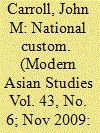

|
|
|
|
|
| Publication |
2009.
|
| Summary/Abstract |
This article frames the debate about mui-tsai (meizai, female bondservants) in late nineteenth-century Hong Kong within changing conceptions of the colony's political, geographical and cultural position. Whereas some colonial officials saw the mui-tsai system as a national shame that challenged Britain's commitment to ending slavery, others argued that it was an archaic custom that would eventually dissolve as China modernized. The debate also showed the rise of a class of Chinese elites who had accumulated enough power to defend the mui-tsai system as a time-honoured Chinese custom, even while acknowledging that in Hong Kong they lived beyond the boundaries of Chinese sovereignty. Challenging notions of the reach of the colonial state and showing how colonial policies often had unintended consequences, this debate also reveals the analytical and explanatory weakness of concepts such as 'colonial discourse' or 'the colonial mind'.
|
|
|
|
|
|
|
|
|
|
|
|
|
|
|
|
| 4 |
ID:
091662
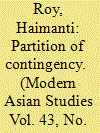

|
|
|
|
|
| Publication |
2009.
|
| Summary/Abstract |
The historiography on the Partition of Bengal has tended to see it as a culmination of long-term trends of Hindu and Muslim communalism within the province. This essay offers a counter-narrative to the 'inevitability' of the Partition by focusing on Bengali public discourse in the months leading up to the Partition. The possibility of a division generated a large-scale debate amongst the educated in Bengal and they articulated their views by sending numerous letters to leading newspapers, district political and civic organizations and sometimes published pamphlets for local consumption. A critical examination of these public debates for and against Partition reveals the countdown to August 1947 as a period of multiple possibilities. Rather than being pre-determined, the stands for a separate or a United Bengal were contingent in nature. Understanding the genesis provides the starting point and the necessary corrective to evaluate India's path to post-colonial nationhood
|
|
|
|
|
|
|
|
|
|
|
|
|
|
|
|
| 5 |
ID:
091664
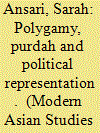

|
|
|
|
|
| Publication |
2009.
|
| Summary/Abstract |
Debates on Islam, citizenship and women's rights have been closely interconnected in Pakistan, from the time of the state's creation in 1947 through to the present day. This article explores the extent to which during the 1950s campaigns to reform Muslim personal law (which received a boost thanks to the outcry against 1955 polygamous marriage of the then Prime Minister, Muhammad Ali Bogra) were linked with wider lobbying by female activists to secure for women their rights as Pakistani citizens alongside men. Through a close examination of the discussions that were conducted on the pages of English-language newspapers, such as Dawn and the Pakistan Times, it highlights in particular what female contributors thought about issues that were affecting the lives of women in Pakistan during its early, and often challenging, nation-building years.
|
|
|
|
|
|
|
|
|
|
|
|
|
|
|
|
| 6 |
ID:
091386
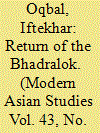

|
|
|
|
|
| Publication |
2009.
|
| Summary/Abstract |
Since the late 1970s, historical studies of colonial Bengal have been dominated by the recurrent theme of the 'return of the peasant', generally set against the previously predominant notion that British-created landlords were omnipotent agents of agrarian relations. Although the new historiography restores agency to the peasant, it seeks to attribute the agrarian decline in the late colonial Eastern Bengal, roughly Bangladesh, to the 'rich peasant'. It is argued that the rich peasant wielded hegemonic authority on their poor fellow co-religionists by forging a 'communal bond', while exploiting them from within. Such development is often considered linked to the separatist idea that offered a 'peasant utopia' in the form of Pakistan against perceived Hindu domination. This article, while not altogether denying the role of the rich peasant, argues that the bhadralok, or the non-cultivating middle-class gentry, were far more powerful as a catalyst in agrarian relations in Eastern Bengal than is conceded in contemporary historical debates. In so arguing, this article re-examines the post-structuralist turn that appeared to replace the classical Marxist paradigm of class by that of culture and consciousness.
|
|
|
|
|
|
|
|
|
|
|
|
|
|
|
|
|
|
|
|
|